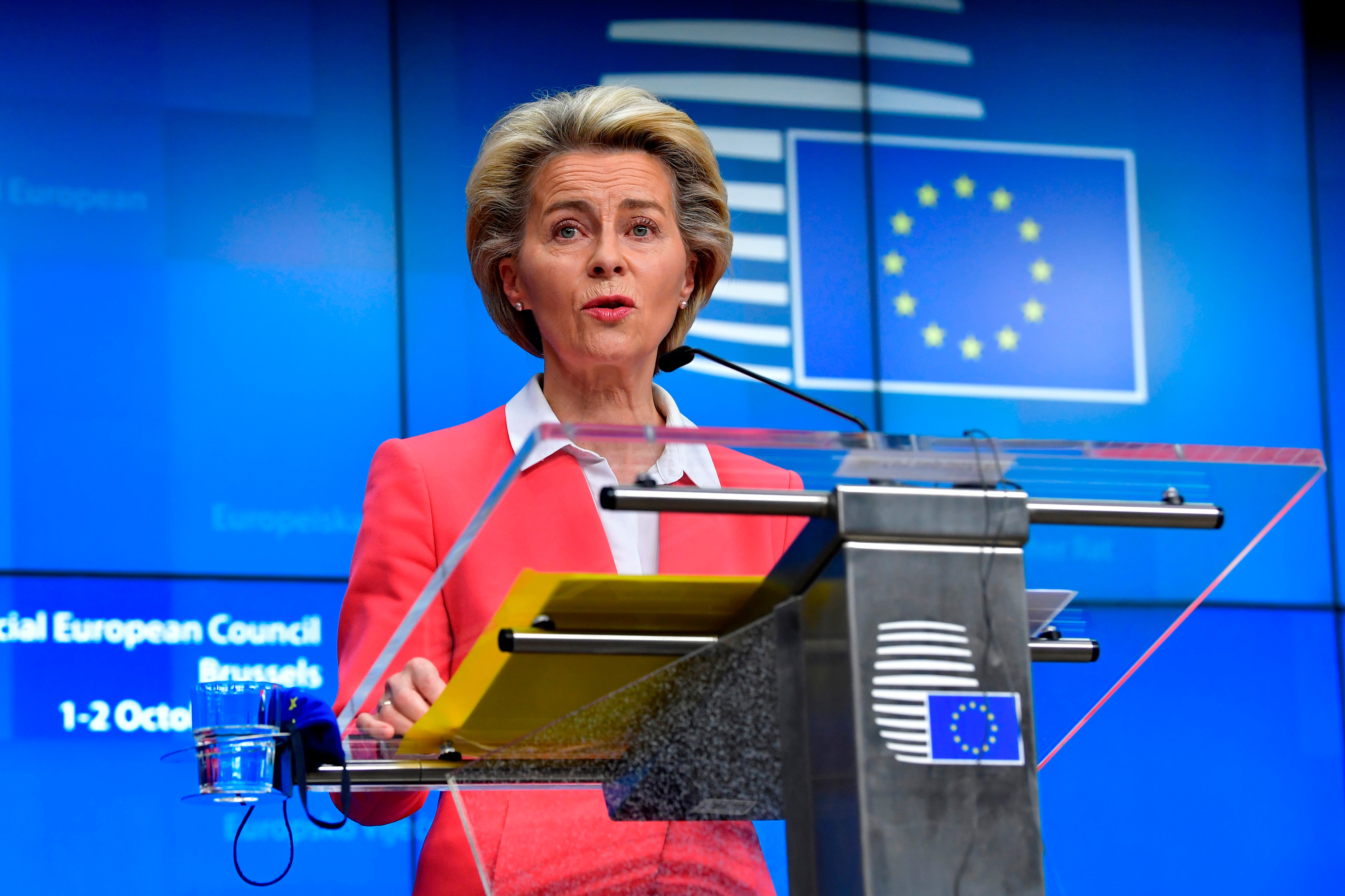Brexit: EU president says talks are ‘running out of time’ and must intensify
Ursula von der Leyen to speak with Boris Johnson on Saturday

Your support helps us to tell the story
From reproductive rights to climate change to Big Tech, The Independent is on the ground when the story is developing. Whether it's investigating the financials of Elon Musk's pro-Trump PAC or producing our latest documentary, 'The A Word', which shines a light on the American women fighting for reproductive rights, we know how important it is to parse out the facts from the messaging.
At such a critical moment in US history, we need reporters on the ground. Your donation allows us to keep sending journalists to speak to both sides of the story.
The Independent is trusted by Americans across the entire political spectrum. And unlike many other quality news outlets, we choose not to lock Americans out of our reporting and analysis with paywalls. We believe quality journalism should be available to everyone, paid for by those who can afford it.
Your support makes all the difference.Brexit trade talks are “running out of time” and must intensify, the European Commission president has warned.
Ursula von der Leyen made her comments ahead of a video meeting with Boris Johnson on Saturday, when the pair of leaders will take stock of progress towards a deal so far.
“We have in German a saying: ‘Wo ein Wille ist, ist auch ein Weg’, translated it is more or less ‘where there’s a will, there's a way’,” the Commission president told reporters in Brussels.
But Boris Johnson insisted that the onus was on the EU to be “common-sensical” and move on key red lines if it wanted a deal.
In a round of regional TV interviews with the BBC shortly after Ms von der Leyen’s comments, the prime minister said: “I hope that we get a deal, it’s up to our friends.
“They’ve done a deal with Canada of a kind that we want, why shouldn’t they do it with us? We’re so near, we’ve been members for 45 years. It’s all there, it’s just up to them.”
The PM said that there was “every chance to get a deal”, adding: “It’s up to our friends and partners to be common-sensical.”
The European Commission president said: “We should not forget we have made progress on many, many different fields but of course the most difficult ones are still open.
“I think we should intensify the negotiations because it is worth working hard on it.”
But asked whether negotiations would go into a “tunnel” – jargon for a period of intensive discussions held in private without the usual degree of transparency – she replied: “I don't like the term 'tunnel', to be honest, because it’s a word association ... we're running out of time, I think 100 days until the end of the year. So it’s worth to step up now.”
Both sides say they are moving closer to a free trade agreement to avoid a no-deal Brexit at the end of the year, but that sticking points remain. Key issues yet to be resolved are the question of fishing rights for EU fleets in British waters, and the extent to which the UK would align with EU rules, notably on state aid.
Boris Johnson has said a deal must be in place by the upcoming European Council summit scheduled for 15 and 16 October, a timetable echoed by the European Parliament, which says it needs time to scrutinise an agreement and get it operational by the end of the year.
But progress was dealt a blow last month after the UK government published a draft law that would override parts of the withdrawal agreement – notably new checks between Northern Ireland and Great Britain signed up to by Mr Johnson.
The European Commission began a process of legal action against the UK on Thursday over the issue after the British government refused to withdraw the offending clauses, which ministers admit break not just the treaty but international law.
Also speaking on Friday, German chancellor Angela Merkel said the UK decision to try and break parts of the Brexit withdrawal agreement with the Internal Market Bill had been a “bitter” moment.
At her own press conference after a meeting of EU leaders in Brussels she said negotiations on trade were “heading for a crucial phase", but said the EU was in a “constructive” mood.
“A lot will be determined by what the UK wants or does not want. As long as talks are ongoing I remain optimistic,” she said.
Speaking at the close of the latest round of trade talks on Friday, David Frost, the UK’s chief negotiator, said that “although differences remain, the outlines of an agreement are visible”. But he added: “I am concerned that there is very little time now to resolve these issues ahead of the European Council on 15 October.”
His EU counterpart Michel Barnier said there had been some progress, but also “persistent serious divergences” on important matters like fishing and the level playingfield.
“To reach an agreement, these divergences must necessarily be overcome over the next weeks,” he said.
“We will continue to maintain a calm and respectful attitude, and we will remain united and determined until the end of these negotiations.”



Join our commenting forum
Join thought-provoking conversations, follow other Independent readers and see their replies
Comments